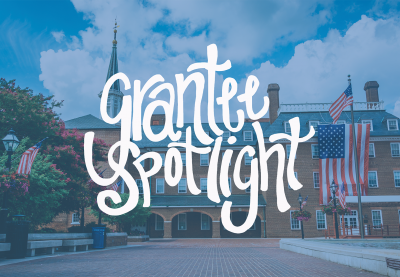This fall, teacher Sarah Emmett will launch a new civic education initiative at her northern Virginia high school. In the last three presidential elections, Latinx voter turnout has been about 10 percent lower than the national average. To encourage more people to register and vote, Emmett created Latinx Advocates.
She turned to Georgetown University’s Institute of Policy and Public Service for recommendations to encourage voter participation. As part of the project, students will learn how to register voters and lead registration drives in their neighborhoods. Engaging students in the grassroots political advocacy process, the project encourages them to step into the role of empowered voter.
TT Grants and School Programs Manager Jey Ehrenhalt caught up with Emmett to talk about her hopes and goals for her school-wide initiative.
Could you summarize the main idea behind your project?
The goal of Latinx Advocates is to have Latinx teens become citizen activists. A citizen activist is a person who campaigns to bring about political or social change. We’re developing youth to be community organizers; to help them build relationships with their legislators at the local, state and national levels; and to encourage them to volunteer with the political campaign of their choice. Ultimately, they could run for office or work for the legislature [in Washington, D.C.], in Richmond or wherever they live.
One of my goals is to get my students excited about politics and have them sign a pledge to run for office. It could be any office, even school board, state delegate, city council or mayor of a small town. We need people who will commit to the future of their country. That’s what it’s all about. We need to keep this republic; we need to keep our democracy. The only way to do that is to have an engaged electorate.
About the Voting and Democracy Grants
In the summer of 2018, TT introduced our first-ever Voting and Democracy Grants. We began accepting applications in May for these classroom, school or district-level grants and will continue through August 31. The grants fund projects that encourage students to learn about and engage in the democratic process, including non-partisan voter registration information and turnout efforts.
How do you plan to kick off the project?
Our first order of business come the end of August when we go back to school is to get the kids to feel confident taking a bus down to Richmond and talking to their elected officials. I recently spoke with Dr. Luis Fraga, who researches Latinx youth engagement at the Institute for Latino Studies at Notre Dame. He recommended we host a panel of our Latinx students in Richmond. He suggested we invite legislative members of the Senate and House to come listen and learn about the students’ experiences.
Later in the year, our first big goal is to have our students lobby in Richmond in February. We’d like to have the students write a bill and then have the legislator introduce it.
How does the Georgetown University study fit into your project vision?
I did some research online and saw that Georgetown University’s School of Public Policy had published a study with a recommendation that schools train Latinx kids how to be advocates. I’ve been in touch with them and they plan to help with the project.
The results from the Georgetown study also supported the idea that kids need to be able to choose the issues they advocate for in order to have community buy-in. My goal is to help them find a local, a state and a federal issue to rally around. They will spend the bulk of the year learning about their issue.
How will students participate in the project?
It will depend. ... This is a huge school of 2,000 kids, and you don’t have to do everything. You can choose to work behind the scenes. You don’t have to be Dolores Huerta. You don’t have to be organizing out in front. There are roles for introverts and extroverts. There are roles for citizens and non-citizens, for people who love social media, for people who like to write or speak out. That’s something I love about politics. There’s something for everybody.
What possible challenges do you foresee coming up as your project gets underway?
I would say the two big challenges will be language and undocumented students worrying they will make themselves targets. Those are two things we need to address. We have ICE raids in our community. ICE has showed up at nearby elementary schools in the past several months. It’s a valid concern, but again, the message is going to be there’s a role for everybody, and not everyone has to be on the front lines. Not everyone has to go to Richmond. Not everybody has to do everything, but they will need to find a piece that resonates with them. It could be the voter registration drive or setting up our website—any number of things.
What advice do you have for other educators interested in engaging families and communities around voting?
A lot of teachers feel so overwhelmed with the work they have to do, and I would say to find a project that you’re passionate about and go with it. This project is something that I always knew I wanted to do, to build a community of youth who can commit to being engaged. It fell right where my interests lie and where our community needs are. I would encourage educators to find something that’s missing in their community and go about fixing it.
Ehrenhalt is the school-based programming and grants manager with Teaching Tolerance.


0 COMMENTS